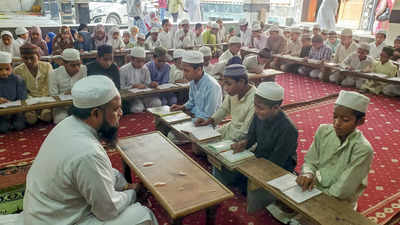Abhishek Singh and Puja Khedkar under scanner for disability claim: Here is all you need to know about UPSC CSE PwD category reservation

[ad_1]
The issue of reservation benefits in India’s prestigious UPSC Civil Services Examination (CSE) has come under scrutiny in the wake of recent controversies. Puja Khedkar, a trainee IAS officer from the 2023 batch, became the first to face allegations of misusing reservation benefits. Reports suggest she might have availed benefits meant for both the Other Backward Class (OBC) quota and the Person with Disabilities (PwD) category.This has sparked outrage, raising concerns about the fairness of the selection process and the potential misuse of reservation benefits intended for marginalised communities.
Following the Khedkar controversy, social media erupted with allegations against Abhishek Singh, a former IAS officer from the 2011 batch. Videos surfaced online showcasing Singh dancing and working out in a gym. These activities raise serious questions about the legitimacy of his claim to belong to the PwD category during the UPSC CSE. Singh reportedly secured his position under the Locomotor Disability (LD) category, which offers reservation benefits to candidates with disabilities. The public outcry highlights the need for a thorough investigation and a robust verification system to ensure that reservation benefits reach those who genuinely require them.
The controversies surrounding Singh and Khedkar highlight the importance of ensuring the legitimate use of reservation benefits for PwD candidates. It emphasises the need for a robust verification process to guarantee that these opportunities reach those who genuinely need them.
Here are some key points and facts about the PwD reservation in UPSC to help you understand the policy and take advantage of it.
Persons with Disabilities (PwD) vs Physically Handicapped (PH): What’s the difference?
The terms “Persons with Disabilities (PwD)” and “Physically Handicapped” are often used interchangeably, but they carry different connotations and reflect the evolving understanding of disability.
Persons with Disabilities (PwD): This term refers to individuals who have long-term physical, mental, intellectual, or sensory impairments which, in interaction with various barriers, may hinder their full and effective participation in society on an equal basis with others. The term “Persons with Disabilities” is the modern, preferred terminology. It aligns with global standards, including the United Nations Convention on the Rights of Persons with Disabilities (UNCRPD). The term emphasises the person first, recognizing that the individual is more than their disability. It promotes dignity, respect, and inclusivity. “PwD” encompasses a wide range of disabilities, including physical, sensory, intellectual, and mental health conditions. This terminology shifts the focus from the limitations of the individual to the need for societal changes and accommodations to ensure full participation in all aspects of life.
Physically Handicapped (PH): This term refers to any physical defect or impairment, whether congenital or acquired, that prevents or restricts a person from participating in normal life activities or limits their capacity to work. It encompasses a range of physical conditions that can affect an individual’s mobility, dexterity, or physical functioning. It can be seen as limiting and stigmatising, as it labels individuals based on their physical limitations rather than recognizing their capabilities and potential. This term is increasingly considered outdated and less inclusive, as it does not encompass the full spectrum of disabilities. It can inadvertently reinforce negative stereotypes and perceptions about disability.
Persons with Disabilities (PwD) is the preferred and more inclusive term, emphasising the individual and their rights, whereas Physically Handicapped is an older term that can be limiting and stigmatising. The evolution of these terms highlights the importance of language in shaping societal attitudes and policies towards disability.
PwD Reservation Policy in UPSC CSE
The Union Public Service Commission (UPSC) Civil Services Examination (CSE) includes a reservation policy for Persons with Disabilities (PwD) to ensure equal opportunities in public employment. This policy is aligned with the Rights of Persons with Disabilities Act, 2016, and the Government of India’s guidelines on reservations for PwDs. Here are the key aspects of the PwD reservation policy in UPSC CSE:
Reservation Percentage
Percentage of Reservation: The UPSC reserves 4% of the total number of vacancies for candidates belonging to the PwD category. This is in line with the provisions of the Rights of Persons with Disabilities Act, 2016.
Categories of Disability
The reservation is provided for the following categories of disabilities:
• Visual Impairment (VI): Blindness and low vision (B/LV)
• Hearing Impairment (HI): Deaf and hard of hearing (D/HH)
• Locomotor Disability (LD): Locomotor disability including cerebral palsy, leprosy cured, dwarfism, acid attack victims, and muscular dystrophy (LD)
• Autism, intellectual disability, specific learning disability, and mental illness (AID/M)
• Multiple disabilities from amongst persons under clauses (a) to (d) including deaf-blindness
• Intellectual Disability (ID): This refers to limitations in intellectual functioning, reasoning, learning, problem-solving, and social skills.
Degree of Disability
For each disability category, the UPSC specifies a minimum degree of disability (40%) required to avail reservation benefits. This ensures the reservation is utilised by individuals facing significant challenges impacting their ability to compete in the exam without these benefits.
Eligibility Criteria
Disability Certificate: Candidates must possess a valid disability certificate issued by a competent authority to be eligible for reservation under the PwD category.
Minimum Standards: PwD candidates must meet the same minimum educational qualifications and age limits as other candidates. However, they may receive certain relaxations in terms of age limit (up to 10 years), number of attempts (9), and qualifying marks.
How to Obtain a Disability Certificate for UPSC Prelims
To obtain a disability certificate for the UPSC Prelims exam, aspirants must secure the certificate before the registration deadline. This certificate is issued by a Medical Board established by either the State or Central Government. The Medical Board must consist of at least three members, one of whom must be a specialist in the specific area of disability, such as hearing, visual, or locomotor impairments. Candidates need to submit this certificate as part of their application process.
Exam Provisions
Exam Centers and Facilities: The UPSC ensures that exam centres are accessible to PwD candidates. They provide necessary facilities such as scribes for visually impaired candidates, extra time for certain disabilities, and seating arrangements to accommodate physical needs.
Preliminary and Main Examinations: PwD candidates are provided with additional time to complete the preliminary and main examinations. The additional time is typically 20 minutes per hour of the examination duration.
Selection and Allocation
Separate Merit List: PwD candidates who qualify for the civil services examination are considered for appointment against the vacancies reserved for them. A separate merit list is prepared for PwD candidates to ensure they compete among peers with similar disabilities.
Service Allocation: The final allocation of services to PwD candidates is based on their rank in the merit list and the preferences they have indicated, subject to meeting the medical standards prescribed for the specific services.
Medical Examination: PwD candidates undergo a medical examination to confirm their eligibility for the service they are allocated. The medical standards vary depending on the specific service, but reasonable accommodations are made for PwD candidates.
Other Benefits
Supportive Measures: The government and UPSC provide various supportive measures such as preparatory materials in accessible formats, training programs, and coaching schemes to help PwD candidates prepare for the examination effectively.
Following the Khedkar controversy, social media erupted with allegations against Abhishek Singh, a former IAS officer from the 2011 batch. Videos surfaced online showcasing Singh dancing and working out in a gym. These activities raise serious questions about the legitimacy of his claim to belong to the PwD category during the UPSC CSE. Singh reportedly secured his position under the Locomotor Disability (LD) category, which offers reservation benefits to candidates with disabilities. The public outcry highlights the need for a thorough investigation and a robust verification system to ensure that reservation benefits reach those who genuinely require them.
The controversies surrounding Singh and Khedkar highlight the importance of ensuring the legitimate use of reservation benefits for PwD candidates. It emphasises the need for a robust verification process to guarantee that these opportunities reach those who genuinely need them.
Here are some key points and facts about the PwD reservation in UPSC to help you understand the policy and take advantage of it.
Persons with Disabilities (PwD) vs Physically Handicapped (PH): What’s the difference?
The terms “Persons with Disabilities (PwD)” and “Physically Handicapped” are often used interchangeably, but they carry different connotations and reflect the evolving understanding of disability.
Persons with Disabilities (PwD): This term refers to individuals who have long-term physical, mental, intellectual, or sensory impairments which, in interaction with various barriers, may hinder their full and effective participation in society on an equal basis with others. The term “Persons with Disabilities” is the modern, preferred terminology. It aligns with global standards, including the United Nations Convention on the Rights of Persons with Disabilities (UNCRPD). The term emphasises the person first, recognizing that the individual is more than their disability. It promotes dignity, respect, and inclusivity. “PwD” encompasses a wide range of disabilities, including physical, sensory, intellectual, and mental health conditions. This terminology shifts the focus from the limitations of the individual to the need for societal changes and accommodations to ensure full participation in all aspects of life.
Physically Handicapped (PH): This term refers to any physical defect or impairment, whether congenital or acquired, that prevents or restricts a person from participating in normal life activities or limits their capacity to work. It encompasses a range of physical conditions that can affect an individual’s mobility, dexterity, or physical functioning. It can be seen as limiting and stigmatising, as it labels individuals based on their physical limitations rather than recognizing their capabilities and potential. This term is increasingly considered outdated and less inclusive, as it does not encompass the full spectrum of disabilities. It can inadvertently reinforce negative stereotypes and perceptions about disability.
Persons with Disabilities (PwD) is the preferred and more inclusive term, emphasising the individual and their rights, whereas Physically Handicapped is an older term that can be limiting and stigmatising. The evolution of these terms highlights the importance of language in shaping societal attitudes and policies towards disability.
PwD Reservation Policy in UPSC CSE
The Union Public Service Commission (UPSC) Civil Services Examination (CSE) includes a reservation policy for Persons with Disabilities (PwD) to ensure equal opportunities in public employment. This policy is aligned with the Rights of Persons with Disabilities Act, 2016, and the Government of India’s guidelines on reservations for PwDs. Here are the key aspects of the PwD reservation policy in UPSC CSE:
Reservation Percentage
Percentage of Reservation: The UPSC reserves 4% of the total number of vacancies for candidates belonging to the PwD category. This is in line with the provisions of the Rights of Persons with Disabilities Act, 2016.
Categories of Disability
The reservation is provided for the following categories of disabilities:
• Visual Impairment (VI): Blindness and low vision (B/LV)
• Hearing Impairment (HI): Deaf and hard of hearing (D/HH)
• Locomotor Disability (LD): Locomotor disability including cerebral palsy, leprosy cured, dwarfism, acid attack victims, and muscular dystrophy (LD)
• Autism, intellectual disability, specific learning disability, and mental illness (AID/M)
• Multiple disabilities from amongst persons under clauses (a) to (d) including deaf-blindness
• Intellectual Disability (ID): This refers to limitations in intellectual functioning, reasoning, learning, problem-solving, and social skills.
Degree of Disability
For each disability category, the UPSC specifies a minimum degree of disability (40%) required to avail reservation benefits. This ensures the reservation is utilised by individuals facing significant challenges impacting their ability to compete in the exam without these benefits.
Eligibility Criteria
Disability Certificate: Candidates must possess a valid disability certificate issued by a competent authority to be eligible for reservation under the PwD category.
Minimum Standards: PwD candidates must meet the same minimum educational qualifications and age limits as other candidates. However, they may receive certain relaxations in terms of age limit (up to 10 years), number of attempts (9), and qualifying marks.
How to Obtain a Disability Certificate for UPSC Prelims
To obtain a disability certificate for the UPSC Prelims exam, aspirants must secure the certificate before the registration deadline. This certificate is issued by a Medical Board established by either the State or Central Government. The Medical Board must consist of at least three members, one of whom must be a specialist in the specific area of disability, such as hearing, visual, or locomotor impairments. Candidates need to submit this certificate as part of their application process.
Exam Provisions
Exam Centers and Facilities: The UPSC ensures that exam centres are accessible to PwD candidates. They provide necessary facilities such as scribes for visually impaired candidates, extra time for certain disabilities, and seating arrangements to accommodate physical needs.
Preliminary and Main Examinations: PwD candidates are provided with additional time to complete the preliminary and main examinations. The additional time is typically 20 minutes per hour of the examination duration.
Selection and Allocation
Separate Merit List: PwD candidates who qualify for the civil services examination are considered for appointment against the vacancies reserved for them. A separate merit list is prepared for PwD candidates to ensure they compete among peers with similar disabilities.
Service Allocation: The final allocation of services to PwD candidates is based on their rank in the merit list and the preferences they have indicated, subject to meeting the medical standards prescribed for the specific services.
Medical Examination: PwD candidates undergo a medical examination to confirm their eligibility for the service they are allocated. The medical standards vary depending on the specific service, but reasonable accommodations are made for PwD candidates.
Other Benefits
Supportive Measures: The government and UPSC provide various supportive measures such as preparatory materials in accessible formats, training programs, and coaching schemes to help PwD candidates prepare for the examination effectively.





